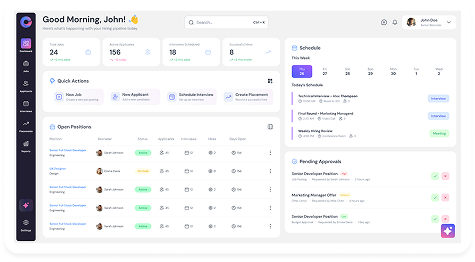Equal Employment Opportunity (EEO) represents the foundation of fair and inclusive hiring practices that every modern organization must embrace. For HR professionals and recruiters, understanding EEO principles isn’t just about legal compliance—it’s about building stronger, more diverse teams that drive business success.
EEO ensures all qualified individuals have equal access to employment opportunities, regardless of their race, color, religion, sex, national origin, age, disability, or genetic information. This principle transforms recruitment from a narrow selection process into an inclusive talent acquisition strategy that benefits both candidates and organizations.
Core Principles of Equal Employment Opportunity
EEO operates on several fundamental legal frameworks that guide recruitment and hiring decisions. The Civil Rights Act of 1964, Americans with Disabilities Act (ADA), and Age Discrimination in Employment Act (ADEA) establish clear parameters for fair employment practices.
These laws require employers to evaluate candidates based solely on job-related qualifications and abilities. Recruiters must focus on skills, experience, and potential rather than personal characteristics unrelated to job performance. This approach creates standardized evaluation criteria that promote objectivity in hiring decisions.
The Equal Employment Opportunity Commission (EEOC) enforces these regulations and provides guidance for implementation. HR professionals should regularly review EEOC guidelines to ensure their recruitment processes align with current legal requirements and best practices.
Benefits of Implementing EEO Practices
Organizations that embrace EEO principles gain significant competitive advantages in talent acquisition and retention. Diverse teams consistently demonstrate higher creativity, better problem-solving capabilities, and improved financial performance compared to homogeneous groups.
EEO compliance reduces legal risks and protects organizations from costly discrimination lawsuits. Companies with strong EEO policies experience fewer legal challenges and maintain better reputations in the marketplace.
Additionally, inclusive hiring practices expand talent pools significantly. When recruiters remove unnecessary barriers and focus on qualifications, they access a broader range of skilled candidates who might otherwise be overlooked.
Common Misconceptions About EEO
Many recruiters mistakenly believe EEO requires hiring less qualified candidates to meet diversity goals. This misconception undermines the true purpose of equal opportunity employment. EEO actually demands hiring the most qualified candidates while ensuring fair evaluation processes for all applicants.
Another common misunderstanding involves affirmative action policies. While affirmative action and EEO share similar goals, they operate differently. EEO focuses on removing barriers and ensuring fair processes, while affirmative action involves proactive steps to increase representation of underrepresented groups.
Some organizations also assume EEO compliance is primarily about avoiding lawsuits. While legal protection is important, the business benefits of diverse, inclusive teams far outweigh simple risk mitigation concerns.
How Technology Supports EEO Implementation
Modern recruitment platforms play a crucial role in facilitating EEO compliance through automated processes and data-driven insights. Advanced applicant tracking systems help eliminate unconscious bias by standardizing candidate evaluation criteria and maintaining detailed records of hiring decisions.
Oorwin’s comprehensive recruitment platform supports EEO initiatives by providing structured workflows that ensure consistent candidate evaluation. The system’s automated screening capabilities focus on job-relevant qualifications while maintaining detailed audit trails for compliance reporting.
The platform’s collaborative tools enable hiring teams to make data-driven decisions based on objective criteria rather than subjective impressions. This approach strengthens EEO compliance while improving overall hiring quality and efficiency.
Building Stronger Teams Through Equal Opportunity
Equal Employment Opportunity represents more than legal compliance—it’s a strategic approach to building high-performing, diverse teams that drive organizational success. HR professionals who embrace EEO principles create inclusive environments that attract top talent from all backgrounds.
Implementing robust EEO practices requires commitment, proper tools, and ongoing education. Oorwin provides the technology foundation needed to support these efforts, offering recruiters the capabilities to maintain fair, efficient, and compliant hiring processes that benefit both candidates and organizations.

